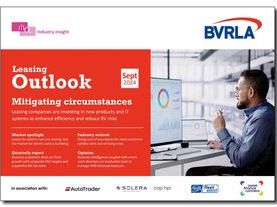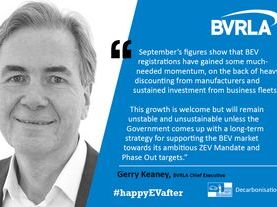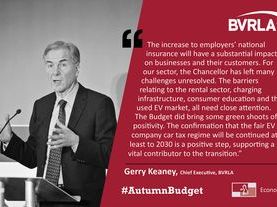The split between business and private demand for new vehicles is becoming a gulf, with the BVRLA’s latest Leasing Outlook report showing the two market segments moving in opposite directions.
Buoyed by a fair tax regime and corporate ESG strategies, demand for Business Contract Hire (BCH) is up 7.1% year on year, while demand for salary sacrifice cars surged by 47% over the same period. Meanwhile, Personal Contract Hire (PCH) has fallen by 7.1% as personal deals bear the brunt of increasing costs and fewer incentives.
With lead times returning to pre-pandemic levels, the BVRLA leasing fleet is up 2.4% to 1.9m vehicles. Both cars (+1.9%) and vans (+3.9%) have recorded year-on-year growth and are giving leasing companies reasons to be optimistic through 2024.
Toby Poston, BVRLA Director of Corporate Affairs, said: “It is great to see the BVRLA member lease fleet growing, but this growing imbalance between the business and retail segments – particularly for EVs – is a real concern.
“Benefit-in-kind and salary sacrifice incentives have fast-tracked corporate uptake of electric vehicles and are underpinning our progress towards the ZEV Mandate targets. Fleet operators and business drivers cannot bear the weight of the EV transition alone, especially as the Mandate targets ratchet up in future years. The spotlight must turn to the private sector. It needs igniting.”
The surging BCH market is accelerating the adoption of cleaner, greener vehicles onto UK roads. In Q4 2023 75% of new additions to the BCH fleet were battery powered (BEV) or plug-in hybrids. For PCH, the situation is flipped with petrol accounting for two-thirds of new registrations.
Writing in the report, Dylan Setterfield, Head of Forecast Strategy, cap hpi, explored ways of addressing the imbalance between business and retail demand: “The government has many tools at its disposal to support BEV uptake and ensure the terms of the ZEV Mandate can be met. An obvious change would be harmonisation of VAT, where public charging costs can be reduced to make EV running costs cheaper for those without off-street parking.
“Other measures must be on the table too and include exemptions from tolls or discounted parking charges. In short, incentives are required. The annual increases set by the Mandate only get steeper between now and 2030.”
While the BVRLA Leasing Outlook highlights the huge uncertainty and financial risk created by an immature used EV market, there are some positive recent developments.
Rachael Jones, Director of Automotive Finance, Auto Trader commented: “Encouragingly, we’re seeing robust levels of consumer demand in the market, particularly for used. In February used cars took an average of 27 days to sell, which was the fastest pace in 12 months, and in March, it’s fallen to just 25, the fastest we’ve ever recorded.”
One of the ways in which leasecos have looked to navigate volatile used values is through second-life leasing or extended contracts. These methods are still in their infancy and, while used car agreements went up 3% from Q3 to Q4 2023, the average contract length for BCH agreements remains flat at 40 months. A growing consideration instead is for managing asset finance risk through better vehicle management while on fleet, with concerns growing over repair times and costs.
Vincent St Claire, Managing Director, Fleet Assist, added: “A period of unprecedented change is being driven by the growing number of new OEMs coming to the UK. Vehicle leasing, rental and salary sacrifice providers will be operating a more diverse selection of new models than ever. Before operating new models, whether they are established OEMs or new entrants, it is critical that their aftersales networks are thoroughly reviewed. Network geographic coverage, booking lead times, and warranty terms will all vary, potentially impacting on customer service, operating costs and vehicle downtime.”
The full report includes analysis from Auto Trader, Cap HPI, and Fleet Assist. Read/download the full report: BVRLA Leasing Outlook - April 2024.
-ENDS-





